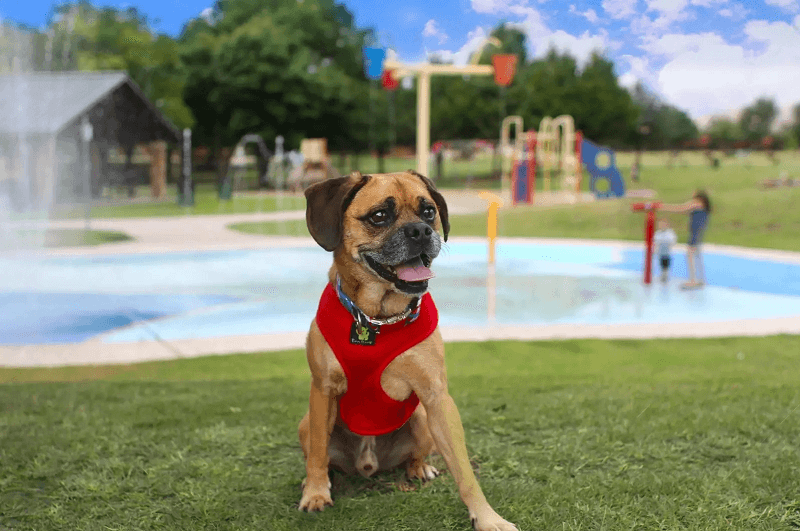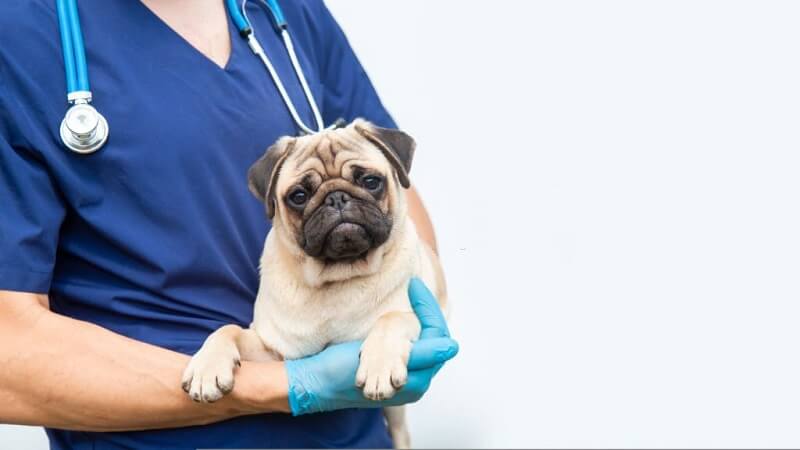Learn about the common health issues facing puggles, including cancer, obesity, eye disorders, hip dysplasia, and respiratory issues. Discover ways to enhance their wellbeing.
I. What do puggles usually die from?
Puggles, which are a crossbreed between a Pug and a Beagle, can be prone to certain health issues that may contribute to their lifespan and potential causes of death. However, it’s important to note that individual dogs’ health can vary, and not all puggles will experience the same issues.

Here are some common health concerns that may affect puggles:
- Respiratory problems;
- Obesity;
- Eye problems;
- Hip dysplasia;
- Intervertebral disc disease;
- Cancer.
Understanding the most common causes of death among puggles can help owners take proactive measures to ensure their pets live long, healthy lives.
One of the primary health concerns for puggles is respiratory problems. Due to their Pug lineage, they often inherit a shortened muzzle, which can lead to brachycephalic airway syndrome. This condition makes it difficult for them to breathe properly, especially in hot or humid conditions or during physical exertion. Respiratory issues can put a strain on their overall health and may lead to severe complications if left untreated.
Obesity is another significant concern for puggles. Their love for food, combined with their genetic predisposition, can make them prone to weight gain. Obesity can contribute to various health problems, including joint issues, heart disease, and diabetes, which can ultimately impact Puggle’s lifespan.
Eye problems are also common in puggles, particularly those inherited from Pugs. Conditions such as corneal ulcers, dry eye (keratoconjunctivitis sicca), and progressive retinal atrophy can affect their vision and overall well-being.
Hip dysplasia, a condition where the hip joint is malformed, is frequently seen in puggles. This can cause pain, lameness, and eventually lead to arthritis if not addressed promptly.
Like many dog breeds, puggles are at risk of developing cancer. Mast cell tumors, lymphoma, and mammary tumors are among the types of cancer that can affect them. Early detection and appropriate treatment are crucial in managing these conditions.
While these health problems may be common among puggles, it is important to note that individual dogs can vary in their susceptibility and overall health. Regular veterinary check-ups, a balanced diet, regular exercise, and maintaining a healthy weight can greatly contribute to their well-being and potentially extend their lifespan.
As a puggle owner, staying informed about these health concerns and working closely with a veterinarian can help you provide the best possible care for your furry companion, ensuring they live a happy and healthy life for as long as possible.
II. How to Keep Your Puggle Healthy and Prevent Early Death?
You can take action as a puggle owner to advance your pet’s wellness and fend off early demise. The following are important advice:
- Regular veterinary care: Schedule routine check-ups to monitor your puggle’s health and catch any potential issues early on. Vaccinations, preventive treatments for parasites, and dental care are crucial aspects of their overall well-being.
- Balanced diet: Provide a nutritious diet that is appropriate for your puggle’s age, size, and activity level. Avoid overfeeding and opt for high-quality dog food to maintain a healthy weight and prevent obesity-related problems.
- Regular exercise: Puggles have moderate exercise needs. Engage them in daily walks, interactive play sessions, and mental stimulation activities to keep them physically fit and mentally stimulated. Exercise helps prevent weight gain and supports overall cardiovascular health.

- Weight management: Monitor your puggle’s weight closely and adjust their diet and exercise accordingly you don’t want them become a fat puggle. Obesity puts them at risk for various health issues, so maintaining a healthy weight is crucial.
- Dental hygiene: Brush your puggle’s teeth regularly and provide dental chews or toys to promote good oral health. Poor dental hygiene can lead to gum disease, tooth loss, and other systemic health problems.
- Environmental safety: Puggles can be sensitive to extreme temperatures. Ensure they have a comfortable living environment and avoid exposing them to excessive heat or cold.
- Be vigilant for signs of health issues: Watch for any changes in behavior, appetite, or physical condition. Seek veterinary attention promptly if you notice anything concerning.
By following these guidelines, you can help ensure your puggle leads a healthy and happy life, reducing the risk of early death and promoting their overall well-being.
III. Top 3 Things to Watch Out For in Your Puggle’s Health
Puggles are a popular breed of dog, known for their friendly and playful personalities. As a responsible puggle owner, it’s essential to be proactive in monitoring your pet’s health. While puggles are generally healthy dogs, there are a few specific issues to keep an eye on. Here are the top 3 things to watch out for in your puggle’s health:
- Breed-specific issues
Puggles are brachycephalic, meaning they have a short snout and flat face. This can lead to a number of breathing problems, such as elongated soft palate, laryngeal collapse, and tracheal collapse. These breathing problems can be life-threatening, so it is important to take your pug to the vet if you notice any signs of respiratory distress.
- Eye problems
Puggles are also prone to eye problems, such as cherry eye, corneal ulcers, and progressive retinal atrophy. Cherry eye is a condition where the third eyelid prolapses, or bulges out. Corneal ulcers are sores on the cornea, the clear covering of the eye. Progressive retinal atrophy is a degenerative eye disease that can lead to blindness.
- Skin problems
Puggles can develop a number of skin problems, such as allergies, hot spots, and sebaceous adenitis. Allergies can cause itching, redness, and hair loss. Hot spots are areas of skin that become inflamed and infected. Sebaceous adenitis is a condition that affects the oil glands in the skin, causing hair loss and scaling.

Remember, every puggle is unique, and their health can vary. In addition to these top three concerns, it’s important to maintain overall wellness by providing proper nutrition, regular veterinary check-ups, dental care, and a safe environment. By staying vigilant and addressing any health concerns promptly, you can help ensure your puggle lives a long, happy, and healthy life.

